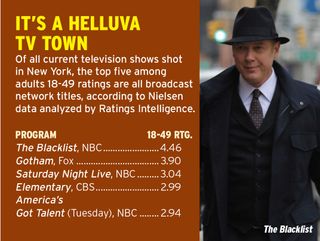Commish Dishes On Why to ♥ New York

In April 2014, New York Mayor Bill de Blasio named TV veteran Cynthia Lopez as commissioner of the Office of Media and Entertainent. She replaced Katherine Oliver, whose work in the Michael Bloomberg administration helped stimulate production in the city to its current level, generating $7 billion in annual spending and 100,000-plus jobs. Lopez, a former coexecutive producer of the PBS documentary series POV, will be welcoming attendees Nov. 12 to the inaugural Content Show, part of B&C parent NewBay Media’s NYC Television Week. She recently shared her thoughts with B&C executive editor Dade Hayes about her office’s mission, the advantages of New York shoots, and how government can be a force for on-screen diversity.
The television business has always had a strong New York anchor. But the level of commitment, certainly among broadcast networks, has increased lately. What do you credit for that?
It’s a testament to the amount of talent we have in New York City, the diversity of our locations and the ease in which we as a city can accommodate filming requests. New York City is arguably the most cinematic city in the world. Point your camera anywhere, and you’re going to find a unique stretch of architecture that translates on screen. We’re even hosting productions that are set in places other than New York City, like Washington, D.C. and Chicago, not to mention previous decades. It’s also incredibly beneficial to have so many television shows here because that means long-term employment for New Yorkers from year to year.

Digital is also booming, with YouTube’s new studio facility opening and streaming series shooting here. How is your office supporting the growth of digital production?
What’s fascinating about many of these digital productions is that they’re often the size and scale of network series, so for shows like the new Marvel/Netflix series or Amazon’s Alpha House the city works with them in the same way we do for The Blacklist on NBC or Gotham on Fox. And on the opposite end, we make it very easy to shoot here, so smaller digital productions can quickly get the permits they need or find that they may not even need a permit when they’re just using handheld cameras. We also support theatrical and digital-only releases through our marketing credit, which provides bus shelter posters and subway cards to promote projects that shoot at least 75% in the five boroughs. The “Made in NY” Media Center by IFP in [the Brooklyn neighborhood of] Dumbo is another great resource for the digital and creative community to collaborate on new projects.
As other states, California in particular, debate tax incentives, New York has put its credits in place through 2019. How does the security of having that on the books free you and your team to pursue all of your other objectives?
People want to film in New York City. They want the atmosphere and the energy, and they know the infrastructure of crews, actors and stage space that we have here. So we want to continue to drive productions to film here. We also look at other ways to support those productions as well as those projects that aren’t necessarily part of the tax credit program. We offer the marketing credit. We host panel discussions to help New Yorkers learn about career opportunities in the industry and community screenings so residents can feel a sense of pride seeing their neighborhood on screen.
Broadcasting & Cable Newsletter
The smarter way to stay on top of broadcasting and cable industry. Sign up below
You have mentioned diversity as a cornerstone of your efforts. Can you talk a bit about what you and your office are doing in that area?
Diversifying the pool of production talent at all levels—directors, producers, union members, PAs—is incredibly important to this administration, and I’m working strategically with the industry to develop opportunities across the board. We’re also very proud of the achievements of the “Made in NY” Production Assistant Training Program, which was developed in partnership with Brooklyn Workforce Innovations. More than 500 New Yorkers who were unemployed or underemployed have gone through this program and now have the skills they need to pursue careers in the industry. And we’re investing in the first graduate school of cinema to be integrated into a working film lot—the Brooklyn College Graduate School of Cinema at Steiner Studios.
